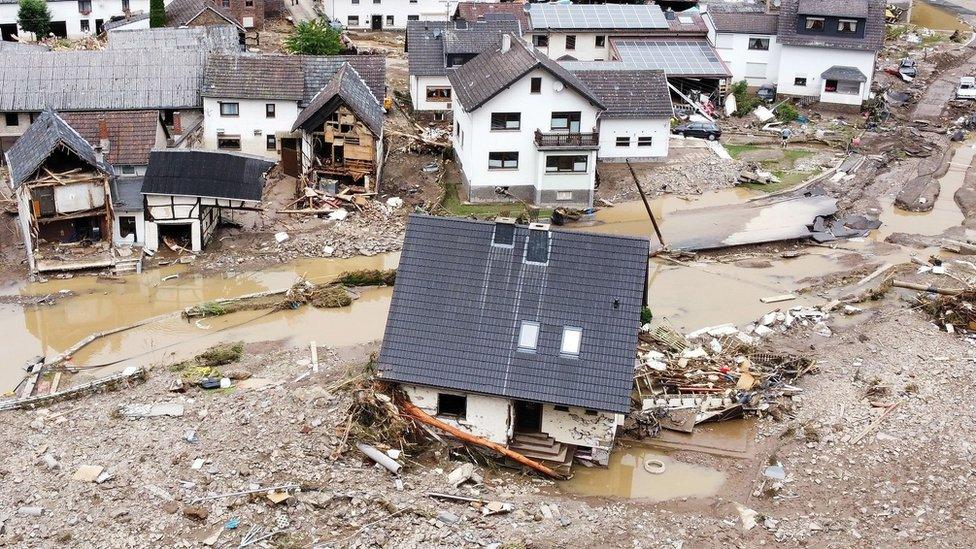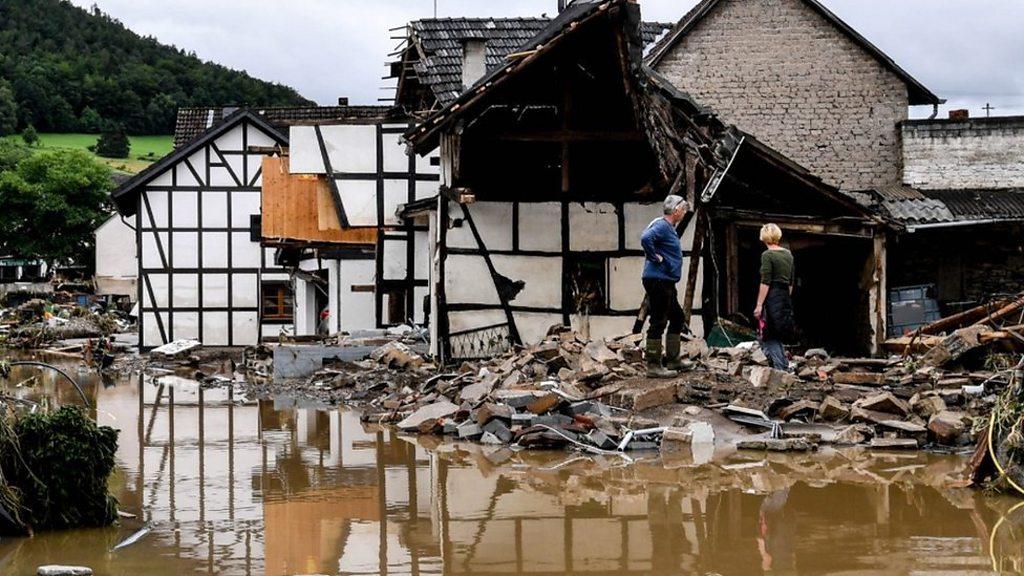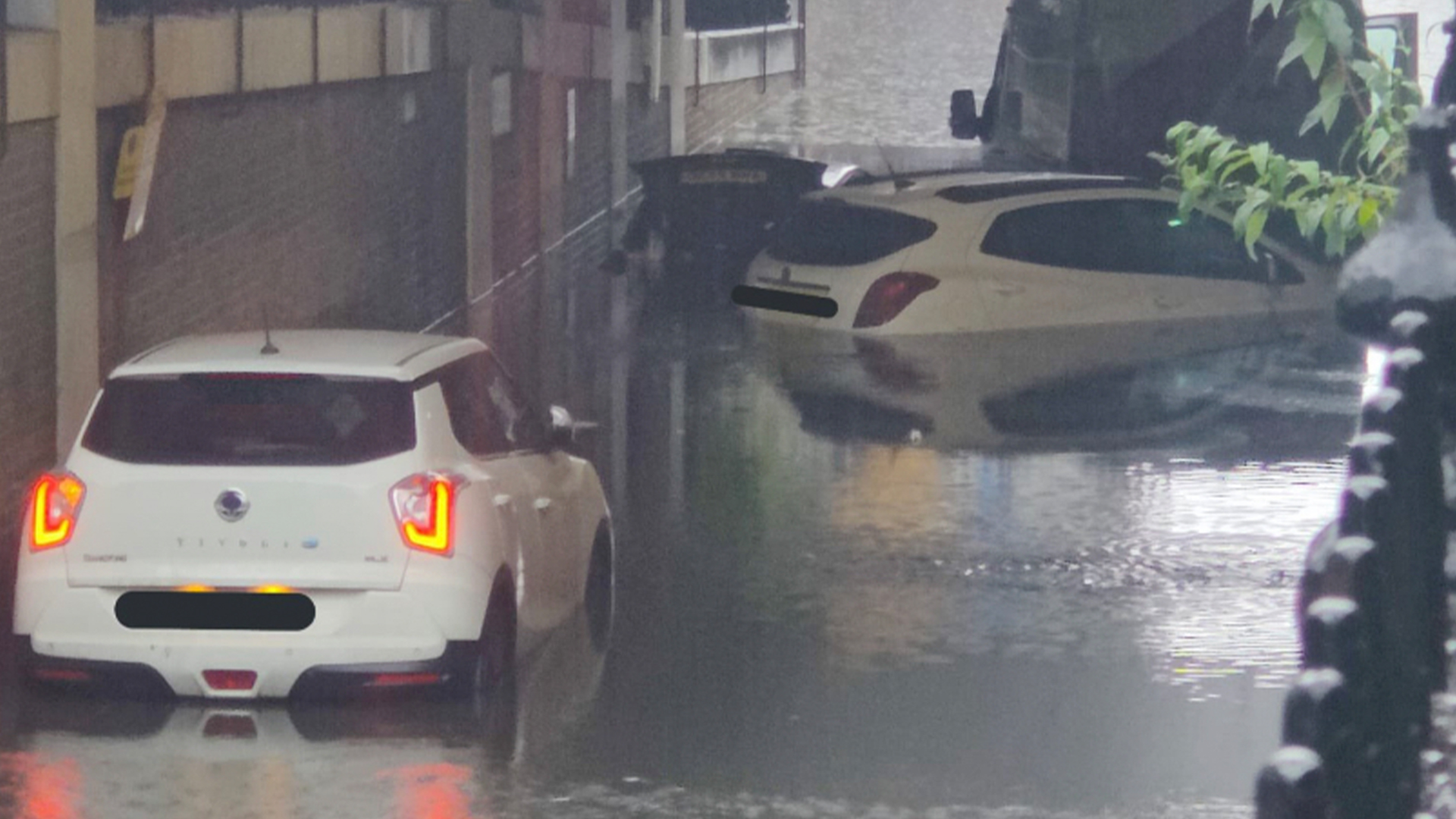Germany floods: Dozens killed after record rain in Germany and Belgium
- Published
The deadly floods have left homes and cars destroyed
At least 70 people have died in Germany and Belgium after record rainfall caused rivers to burst their banks.
Most of the victims were in Germany, but at least 11 have died in Belgium, with more reported missing.
The German states of Rhineland-Palatinate and North Rhine-Westphalia were worst hit, but the Netherlands is also badly affected.
More heavy rain is forecast across the region on Friday, while local officials have blamed climate change.
Armin Laschet, the premier of North Rhine-Westphalia, blamed the extreme weather on global warming during a visit to a hard-hit area.
"We will be faced with such events over and over, and that means we need to speed up climate protection measures... because climate change isn't confined to one state," he said.
Experts say that climate change is expected to increase the frequency of extreme weather events, but linking any single event to global warming is complicated.
German Chancellor Angela Merkel, who is in the US ahead of a meeting with President Joe Biden, called the flooding a "catastrophe" and said she was "grieving those who have lost their lives".
"My thoughts are with you, and you can trust that all forces of our government - federal, regional and community - collectively will do everything under the most difficult conditions to save lives, alleviate dangers and to relieve distress."
Your device may not support this visualisation
In Germany, police helicopters and hundreds of soldiers have been deployed to affected areas to help stranded residents.
Dozens of people waited on rooftops to be rescued.
Schools have been closed around the west of Germany, while transport links have been severely disrupted.
About 25 houses are in danger of collapsing in the district of Schuld bei Adenau in the mountainous Eifel region, where a state of emergency has been declared, according to German broadcaster SWR.
It said some houses had been completely cut-off and could no longer be reached by boat.

The army has been deployed to help people in affected areas
Residents in the region told AFP news agency they were stunned by the disaster.
"Nobody was expecting this - where did all this rain come from? It's crazy," Annemarie Mueller, a 65-year-old resident of Mayen, said. "It made such a loud noise and given how fast it came down we thought it would break the door down."
Local teacher Ortrud Meyer, 36, said she had "never seen anything like this".
"My father-in-law is almost 80, he's from Mayen, and he says he's never experienced anything like this," she said.
In Belgium, dramatic footage of the floods showed cars being swept away along a street in the city of Verviers.
Allow X content?
This article contains content provided by X. We ask for your permission before anything is loaded, as they may be using cookies and other technologies. You may want to read X’s cookie policy, external and privacy policy, external before accepting. To view this content choose ‘accept and continue’.

Residents of Liège, Belgium's third-largest urban area after Brussels and Antwerp, were ordered to evacuate. Those unable to leave should move to the upper floors of their buildings, local officials said.
The Meuse river which flows through the city is expected to rise by another 1.5 metres, despite being on the verge of overflowing already. Officials are also concerned that a dam bridge in the area may collapse and urged people to help each other.
"The crisis situation is exceptional and solidarity must prevail," the local authority said in a statement.
Residents of the Belgian town of Pepinster, which lies at the confluence of two rivers in Liège province, were evacuated in a large truck on Thursday, but conditions in the municipality of Trooz are so bad that evacuation efforts have been halted.
In the Netherlands, there have been no casualties reported but thousands of people in towns and villages along the Meuse river have been urged to leave their houses quickly.
In the Dutch city of Maastricht, 10,000 people have been ordered to evacuate.
And flooding in Valkenburg, close to the Belgian and German borders, engulfed the town centre and forced the evacuation of several nursing homes.


Have you been affected by the flooding? Please share your experiences.
Please include a contact number if you are willing to speak to a BBC journalist. You can also get in touch in the following ways:
WhatsApp: +44 7756 165803
Tweet: @BBC_HaveYourSay, external
Please read our terms & conditions and privacy policy
If you are reading this page and can't see the form you will need to visit the mobile version of the BBC website to submit your question or comment or you can email us at HaveYourSay@bbc.co.uk, external. Please include your name, age and location with any submission.
Related topics
- Published15 July 2021

- Published13 July 2021
